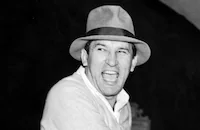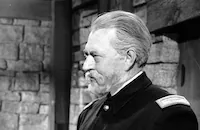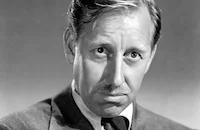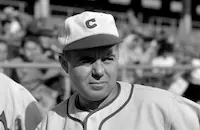Boots Malone

Brief Synopsis
Cast & Crew
William Dieterle
William Holden
Stanley Clements
Basil Ruysdael
Carl Benton Reid
Ralph Dumke
Film Details
Technical Specs

Synopsis
At Dellington Park racing track, down-and-out jockey agent Boots Malone lives with ex-jockey Stash Clements in trainer Preacher Cole's tack room. Boots has not represented a jockey for two years since his prize client died in a stable mishap, and is continually hounded by big-time gambler Matson for repayment of a loan. One evening at the local diner, Boots and Stash are startled when an unfamiliar teenager, Tommy Gibson, attempts to pay for his meal with a hundred dollar bill. Boots sizes Tommy up as an easy mark and upon discovering his interest in horses, convinces him to stay in Preacher's tack room, where he tries unsuccessfully to steal the hundred dollars. Boots does convince Tommy to pay for them to stay at a hotel, and impressed by a speech Boots gives the next day at Dellington Park, Tommy asks Boots to train him as a jockey. When Tommy offers to pay him, Boots agrees. Soon Tommy is mucking out stalls and cleaning the tack room. Slick agent Brady, meanwhile, convinces wealthy horse owner Howard Whitehead that Preacher's only horse, Mother, is a good risk in the next claim race and to Preacher's dismay, Mother is bought out from under him. Boot arranges with Whitehead's trainer, Beckett, to get Preacher one of Whitehead's horses, White Cargo. They tape weights onto the horse's ankles before his next race and when Whitehead sees the horse's poor performance, he quickly agrees to sell him at auction. Boots organizes all the jockeys to contribute money to buy White Cargo and raises $1,400. The next day at the auction, when a drunk pushes the bid to $1,500, Tommy contributes the extra hundred dollars. Deciding to move the horse south to train away from Whitehead, Boots refuses to take Tommy, until the boy demands a refund for the training he paid for but never received. Grudgingly, Boots allows Tommy to come along. On the trip the car overheats, and as Tommy walks out White Cargo, the horse is startled by a rattlesnake and bolts. Tommy hangs on and manages to bring the horse under control. Impressed by Tommy's ability, Stash induces Boots to train Tommy as White Cargo's jockey, despite his being a year shy of the age limit. Stash works on Tommy's conditioning and Boots joins in his training. When Tommy grows curious about Boots's past, Preacher tells him that Boots lost his wife in childbirth fifteen years earlier. Later, Boots reacts uncertainly when Tommy registers for his jockey license as Tommy Malone. Preacher takes over Tommy's training and readies him for his first race. Unknown to Tommy, Boots and Preacher weigh down White Cargo's shoes before the race so he will finish poorly and drive his odds up for future races. Tommy loses the race and is devastated. Boots arranges for him to ride another horse in the next race, and Tommy wins and regains his confidence. On the trip back north, Boots realizes they are being followed and, worried that Matson has tracked him down, calls the gambler with a tip to bet heavily on White Cargo. Upon arriving at Dellington Park, Stash reports that they have been followed by a private detective who is looking for Tommy. Boots jumps the man and learns Tommy has run away from a posh boarding school and lied about his whereabouts to his mother, the wealthy head of a perfume factory. Boots contacts Mrs. Gibson, who flies in the day before the race and takes Tommy away, convincing him that Boots turned him in for a reward. That night, Tommy secretly breaks away from his mother and returns to Dellington to berate Boots, before admitting he only came back for Boots's approval. Boots calls Mrs. Gibson, but cautions her if she does not allow Tommy to race she will lose his respect forever. Brady, meanwhile, contacts Matson and tells him to place all bets, on Whitehead's horse and assures him White Cargo is a loser. When Boots hears about the bets, he asks Tommy to throw the race so Whitehead's horse can win, but Tommy refuses. During the race, several jockeys crowd Tommy against the rail, but he wins. That night at the train station, Tommy tells Boots that he has promised his mother to return to school and she has agreed to buy a stable, which Tommy asks Boots to manage. Boots refuses but as the train departs, Stash drives up and tells him Matson is waiting for him, so Boots jumps on the train, where Tommy happily welcomes him.

Director

William Dieterle
Cast

William Holden
Stanley Clements
Basil Ruysdael

Carl Benton Reid
Ralph Dumke

Ed Begley
Hugh Sanders

Henry Morgan
Ann Lee

Anthony Caruso
Billy Pearson
Johnny Stewart
John W. Frye
Harry Hines
Toni Gerry
Hurley Breen

Whit Bissell
Earl Unkraut
Harry Shannon
John Call
Pat Williams
Ken Christy
David Fresco
Gene Collins
Hank Worden

Harlan Warde
Frank O'connor
Bigelow Sayre
Richard Rossell
Emory Parnell
Ralph Volkie
Charles Sullivan
Donald Kerr
Bill Wallace
Mike Lally
Charles Campbell
Duke Watson
Emile Meyer
Earle Hodgins
Benny Burt
William Vedder
Charles Edward Adams
Lennie Bremen
George Holmes
Carleton Young
Harry Harvey
James Hollander
Grover C. Warren
Alfred M. Conners
Grandon Rhodes
Florence Auer

Frank Ferguson
Irving Smith
Milt Kibbee
Harry Tyler

Ray Walker
Hal J. Moore
Eula Guy
Dewey Dick
Tom Gibson
Glen Mccarthy
William Mccormack
Snub Pollard
George Ross
Jim Reeves
Earl Spainard
George Plues
Franklyn Farnum
Paul Bradley
George O'bryan
Eugene White
Earl Brown
Eddie Arden
Crew
Elmer Bernstein
Harold Buchman
Clay Campbell
Al Clark
Lodge Cunningham
Milton Feldman
Milton Holmes
Milton Holmes
Charles Lawton Jr.
Cary Odell
Morris Stoloff
Frank [a.] Tuttle

Videos
Movie Clip



Film Details
Technical Specs

Articles
Boots Malone
Those are good notices for a movie that is today essentially forgotten. Boots Malone was, in a sense, "forgotten" even at the time of its release. Producer Milton Holmes sued Columbia Pictures for $1 million for not publicizing and distributing the film according to the contract. He claimed that Columbia spent less than 5% of the customary amount to publicize it, that small houses were used for first-run bookings, and that the studio released the picture too late to qualify for Oscar® consideration, even though they had told him it was potential Oscar® material.
Holmes was also one of two screenwriters who worked on Boots Malone. The other, Harold Buchman, was originally uncredited due to his blacklisting after refusing to answer questions by the House Un-American Activities Committee. His credit is now restored. Meanwhile, another writer, Leo Katcher, sued Columbia for $50,000, claiming that the studio plagiarized two of his scripts to come up with Boots Malone.
As for the film itself, Boots Malone is a coming-of-age story with echoes of The Champ (1931). Newcomer Johnny Stewart plays a rich runaway whose love for horses leads him to a racetrack where jockey agent William Holden takes him under his wing. The kid learns to become a man (and jockey), while Holden finds new strength of character. Above all, however, Boots Malone is a film of convincing atmosphere, depicting quite well the seedier side of the racetrack world, including the hangers-on and crooks who will do anything for a buck. It was filmed mostly at real tracks and stables.
18-year-old Johnny Stewart had just appeared on Broadway in The King and I, playing the young Siamese prince. William Holden, on the other hand, was by now a huge Oscar-nominated star with movies such as Sunset Blvd (1950) and Born Yesterday (1950) under his belt. He had just finished work on a minor film, Submarine Command (1951), and as film historian Lawrence Quirk has written, "[Boots Malone was] slight stuff, though the star turned in his customary sincere job... The picture did nothing to advance Holden's career; it did nothing to hinder it either." A year later Holden would be starring in Billy Wilder's Stalag 17 (1953), for which he would win his only Academy Award. Before that, however, Holden would work with Boots Malone director William Dieterle one more time, on The Turning Point (1952).
Boots Malone was scored by Elmer Bernstein, working on only his second feature film.
Producer: Milton Holmes
Director: William Dieterle
Screenplay: Milton Holmes, Harold Buchman
Cinematography: Charles Lawton, Jr.
Art Direction: Cary Odell
Music: Elmer Bernstein
Film Editing: Al Clark
Cast: William Holden (Boots Malone), Stanley Clements (Stash Clements), Basil Ruysdael (Preacher Cole), Carl Benton Reid (John Williams), Ed Begley (Howard Whietehead), Ralph Dumke (Beckett).
BW-102m.
by Jeremy Arnold

Boots Malone
Quotes
Trivia
Notes
The working title of this film was Sure Thing. Young stage actor Johnny Stewart made his screen debut in the picture. Although Milton Holmes was given sole writing credit when the film was initially released, the WGA restored blacklisted screenwriter Harold Buchman's credit. WGA's official credits for the film now read: "Written by Milton Holmes and Harold Buchman."
According to news items in Variety and Los Angeles Examiner, in May 1952, producer Milton Holmes filed a $1,000,000 breach of contract suit against Columbia Pictures, charging that Boots Malone was not properly publicized and distributed as agreed upon. Holmes claimed that in the agreement between the studio and Sidney Buchman Enterprises, Inc., Buchman was to produce the film, and Holmes as screenwriter, was to receive 15% of the gross receipts.
Buchman, who was cited for contempt for refusing to testify before the House Committee on Un-American Activities, withdrew from the production and Columbia asked Holmes to take charge of the film. Holmes claimed he received no producer salary. The outcome of the case has not been determined. In July 1952 writer Leo Katcher filed a $50,000 plagiarism suit against Columbia, stating that Boots Malone was a combination of two separate scripts he submitted to the studio on three different occasions. The outcome of that suit also has not been determined.














